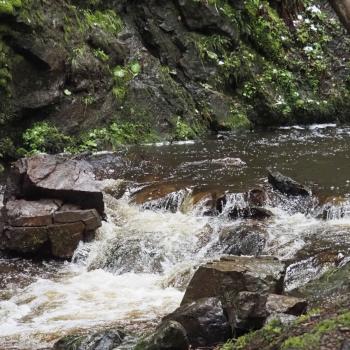There are surges of grief. But there is so much work to be done as well. Perhaps that's a part of the healing, or part of the escape that one needs. You just put your head down and work as hard as you can.
What should every Christian in the United States know about what's happening in Haiti? What would you want the church in America to know?
This theme that I saw in Haiti while I was living there, as well as during these last five weeks, that I'm constantly humbled by, is people's response of gratitude. Which is something like worship, or what worship should be: pure thankfulness to God.
It seems like we--and I include myself--so often focus on what is wrong with the country or the church, or we focus on our own ambitions and what we want out of life. To go to church in Haiti even before the earthquake, when people are making less than $2 a day, and then to go to church now, next to a crumbled building, and to see people not naïve about how hard life is at all, and yet they are overflowing with gratitude to their Creator--it's truly humbling, and something that we as Americans should think about.
Then there is the point that we should consider what Jesus says about helping those in poverty. Haiti is only ninety minutes away from America. Haitians are our neighbors, and they are facing life and death needs. We have to consider what our responsibility is as churches. How should we respond to this disaster in light of the gospel, which makes radical claims when it comes to these matters?
This interview is part of a series called "In the Trenches." What does it mean for you to do ministry that is in the trenches?
For me, it means not just going to save other people who are quote-unquote ‘in the trenches.' I go to help, but I also I go to be helped. I go to teach, but I had better be vulnerable to learning and listening and understanding.
People who come in from the outside are not saviors. Rather, we are seeking the Savior together with the Haitians. For me, going into the trenches means entering as a learner even more than a helper. As we do that, as we listen and learn, hopefully we will become better able to help. We will seek together to have our lives and the lives of those around us transformed by God's grace.
Has your view of God been challenged by the earthquake?
In these past five weeks, my faith and my prayers have definitely resembled the Psalms more than anything. I don't understand the answers, but I am crying out to God. One prayer that kept coming to mind after the earthquake is, "How long, O Lord, how long?" This refrain is repeated throughout the Psalms. How long the people of Haiti have suffered already--and now this?
Another verse that comes to mind is "Come, Lord Jesus, Come." These basic refrains are full of faith because they're full of longing, not because they're full of answers and understanding.
Then, on the other side, in spite of how unbelievably awful this is, our faith has to be open-eyed. We should not be caught off-guard that we live in a world that can be brutal. We should not have a faith that is in denial about the kind of world we live in.
Where do you find Jesus?
In addition to the traditional ways, Jesus says in Matthew 25, "When I was hungry, did you feed me? When I was thirsty, did you give me to drink?" That's a part of my answer to the question of what it means to ministry "in the trenches."
Maybe we find God and we find Jesus in a really nice church building in the United States on Sunday morning. But if we listen to Jesus, then we'd better also be seeking Jesus among the rubble, among the ruins. And we better go not just as saviors, but to seek the Savior together.
Finally, you recently published a book with InterVarsity Press. Can you give us a nutshell summary, in case some of our readers may want to purchase it?
It's along the lines of these last questions. Jesus tells the story of the rich young man, and invites him to give everything away to the poor to follow Jesus. Now, I have walked away from that calling many times, but this is the story of my trying to follow. It's a story of Haiti, but it's also a story of trying to follow and to find Jesus in a radical way. I am honest about all my stumbles and failings along the way, but I also find new meaning and new joy along the way as well.
If someone is interested in Haiti right now, it is an interesting book to see what it's like to live and work in Haiti. But I really wrote it for anyone who might want to get more involved in ministry--inner-city ministry, or ministry in your town--and just wants to push a little further, stretch a little further beyond what you've normally done; I hope it's applicable for anybody who wants to keep following and see where we're led.
Please visit the Haiti Partners website for more information on the organization, visit the blog, or go to make a contribution to their earthquake relief efforts. Also, Kent Annan's book can be purchased below. All proceeds from the book go to support the ministry in Haiti.




